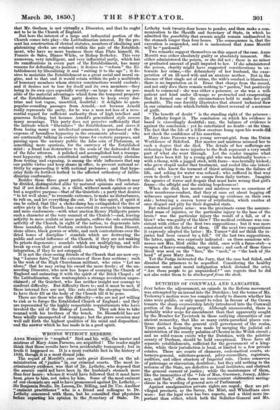WRONGS', WITHOUT. REDRESS.'
ANNE Mmuurr is " respited." Bird and his wife, the master and mistress of Mary Anne Parsons, are acquitted. ! The reader might think that those results have been accidentally transposed ; but in truth it happened so. It is a most. veritable fact in the history of 1850, though it is a most 4'41 joke.
The sequel of Merritt's, .case casts great discredit on the ad- ministration of !' justice" in, our criminal courts. The most in-
criminatory evidence was that of Letheby, who deposed that the arsemc could not have been in the husband's stomach more than four hours : whence it would have followed that it must .have been given to him, not taken by him. Some of the most eminent of our chemists are said to have pronounced against pr. Letheby,- Sir Benjamin Brodie, Dr. Leeson,Dr. Billing, and Dr. -Ore. Another " eminent practitioner" who is a friend and colleague to Dr. Letheby concurred with them, but he consulted that physician before reporting his opinion to the Szerettiay of State. Dr. Letheby took twenty-four hours to ponder, and then make a com- munication to the Sheriffs and Secretary of State, in which he admitted the possibility that arsenic might remain undissolved in the stomach longer than four hours. The consequence is, that the execution is suspended, and it is understood that Anne Merritt will be "pardoned."
Two remarks suggest themselves on this aspect of the case. Anne Merritt was either absolutely guilty or absolutely innocent. She either administered the poison, or she did not ; there is no minor or graduated amount of guilt imputed to her. If she administered the poison, charity might have suggested considerations to ex- tenuate her crime,—the debauchery of her husband, the exas- peration of an ill-used wife and an anxious mother. But in the absence of that single act of crime, the wife's conduct is blameless : there is no imputation on it. Erase that charge from the record, and not only does there remain nothing to " pardon," but positively much to commend : she was either a poisoner, or she was a wife patient and kind under ill-usage so protracted and exaspera that it formed one of the circumstances held to make her gt probable. The ease forcibly illustrates that absurd technical flaw in our criminal code which forbids the direct reversal of a sentence of guilt.
" The benefit of doubt " is the standing right of the prisoner : Dr. Letheby forgot it. The conclusion on which his evidence is based is exceedingly doubtful; nay, the balance of evidence is against the conclusion : yet he entertained no doubt—at the time. The fact that the life of a fellow creature hung upon his words did not cheek the confidence of his assertion.
Mary Anne Parsons was a young servant-girl, from the Union Workhouse of Bideford. Her master and mistress misused her to such a degree that she died. The details of her sufferings are sickening ; but the mere injuries to the flesh represent a very small part of what she went through. Let the reader imagine what must have been felt by a young girl who was habitually beaten— with a thong, with a jagged stick, with furze—was brutally kicked ; who grew stupid under that treatment, and reeled like one intoxi- cated; who knew the torment of thirst arising from the failure of life, and asking for water was refused ; who suffered in that way even to death—yet knew no escape from daily torture. Imagine the agonies of terror and despair. that must have wrung that girl's frame,--the affright and the sinking hopelessness !
When she died, her master and mistress were so conscious of their murderous conduct, that they at once set about begging off witnesses against them, and vamping up evidence on their own side ; betraying a craven terror of retribution, which excites at once disgust and pity for their degraded state. But refined points arise : was the proximate cause the accumu- lated moss of injuries or the particular injury to the base of the
brain ? was the particular inj the result of a fall, or of a blow? who was guilty of the blow ?ury The medical evidence was con- sistent with either of the first two suppositions ; but it was more consistent with the latter of them. Of the next two suppositions it expressly adopted the latter : Mr. Turner " did not think the in- juries had been caused by a fall." Of the last two suppositions, latter, again, was expressly indicated : on three occasions wit-
nesses saw Mrs. Bird strike the child, once with a furze-stub—a weapon of heavy-sounding, savage name ; and each of those times blood was seen on the "face," the "neck," or "the back of the head " of poor Mary Ann. Yet the Judge instructed the Jury, that the case had failed, and directed the prisoners to be acquitted. Considering the healthy common sense and moral indignation which dictated the cries, " Are these people to go unpunished ? " one regrets that he did not also order them to be discharged from the dock.


























 Previous page
Previous page